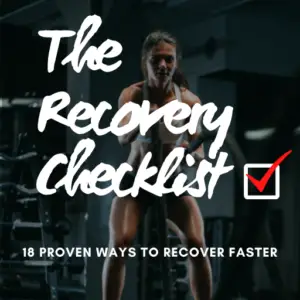Superb nutrition and consistent exercise won’t hurt your chances of living longer. But the optimism and longevity connection is vastly underrated.
Perhaps because it’s less concrete than walking 30 minutes a day or eating a plant-based diet.
Before diving into optimism and longevity relationship (and 5 practical tips to be more optimistic), let’s unpack the mind-body connection.
Mind-Body Connection
Much like Bigfoot, the mind-body relationship is wrapped in mystery and legend.
And writing on concrete topics is right in my wheelhouse. Concepts like low back pain, strength training, and what science says about massage guns.
I’m not alone. It’s easy for science-based fields (e.g. Western medicine) to ignore the mind-body connection.
But the mind’s role in health and healing is too big to ignore. Tons of scientific evidence proves how powerfully your mind influences your body.
Here are 3 examples:
1) Placebo Treatments
Well-designed research studies compare the real treatment to a placebo (or sham) treatment that’s supposed to have no effect.
For example, scientists studying a blood-pressure pill would give half the subjects the real blood pressure drug. The other study participants get a sugar pill. The sugar pill (theoretically) won’t affect blood pressure since it doesn’t contain any medication.
The drug “works” if it lowers blood pressure better than the placebo pill.
However, placebo treatments can work miracles. And make you question everything you thought you knew about reality.

Check out these mind-boggling placebo effects:
- Four placebo pills accelerated ulcer healing faster than two placebo pills.
- Expensive medications work better than inexpensive medications. Even when it’s the exact same drug!
- Placebo surgery – where the surgeon makes incisions but doesn’t do the actual surgery – relieves knee pain from arthritis and meniscus tears.
- Placebo surgery even works for Parkinson’s disease!
To learn the details of these studies, plus more weird placebo facts, check out this research article:
The Art of Surgery: The Strange World of the Placebo Response
2) Spinal Manipulation
Physical therapists, osteopathic doctors and chiropractors use spinal manipulation for back pain, neck pain and headache relief.
Getting your spine cracked or popped isn’t re-aligning anything – that’s a common back pain myth – but it can provide rapid pain relief.
Especially when you expect it to work.
Patients with positive expectations experience excellent pain relief while negative expectations are linked to more pain after spinal manipulation (Bialosky 2008).

Individuals with neck pain have worse outcomes if they expect neck manipulation to help but don’t get their necks cracked. Study subjects also report less pain if they expect to make a full recovery (Bishop 2013).
Clearly, patient expectations dictate the efficacy of spinal manipulation.
3) Aging
As alluded to previously, optimism and longevity are intertwined – positive individuals enjoy a 14% longer lifespan (Lee 2019).
Optimists are also less likely to develop chronic diseases and die prematurely. And they have greater odds of achieving “exceptional longevity” by living >85 years.
Plus, positive aging expectations correlate to higher physical activity levels in older adults. And physical activity is a no-brainer for those looking to live long, healthy, independent lives.
How to Be More Optimistic
It’s a little off brand to tell you to “Send out good vibes into the universe to attract perfect health and the life of your dreams.” And a bit impractical.
Nonetheless, optimism and positive expectations have real effects on how long we live and how fast we heal.

Here are 5 strategies to bring you optimism and longevity. Let’s start with the least popular strategy (and just get it over with).
1) Turn Off the News
Negativity sells. The human brain isn’t built to process all the tragic events happening in the entire world.
The news makes it seem like the world is collapsing, even though objectively it’s gotten a lot better in the past few decades.
Check out the book Factfulness to learn more and gain a more optimistic view of the world.
On a personal note, I’m less anxious and more optimistic since curtailing my news intake 2 years ago – instead of a daily news podcast and the nightly news, I read 1-2 newsletters in the morning.
2) Celebrate Small Victories
Celebrating the little victories in your career, relationships, finances and fitness makes life more fun.
Plus, the positive reinforcement creates habits, making future success more likely.
3) Practice Gratitude
My HR department would call this a “growth opportunity” for me. There’s so much we have to be grateful for. But it’s easier to focus on what we don’t have yet or wish to one day attain.
4) Work with Professionals You Trust
No doubt this is sound advice when choosing an accountant. It’s equally true when picking your healthcare providers.
You literally heal faster when you have confidence in your doctor, surgeon, or physical therapist.
Work with experts who instill confidence and make you feel empowered and informed. Avoid those who try to scare you into compliance or dependence.
5) Find Positive Influences
Optimism spreads. So does negativity.
Instead of wallowing in eternal sadness with the negative people in your life, surround yourself with people who have a contagious love for life.
You will be happier. And live 14% longer.
More Mind-Body Insights
There you have it – 5 ways to capitalize on the optimism and longevity connection.
This article barely scratches the surface of the mind-body relationship. Learn more about the multifaceted nature of pain, health and healing in these articles:
Will Losing Weight Fix My Pain?
Mouth Wounds and Stress: How to Heal Faster
Readers: Are you naturally optimistic? Pessimistic? Realistic? Does it affect your health? Share your thoughts in the comments.
For more evidence-based health tips, join the free Facts & Physio Newsletter. Plus, get The Recovery Checklist e-book when you sign up.

